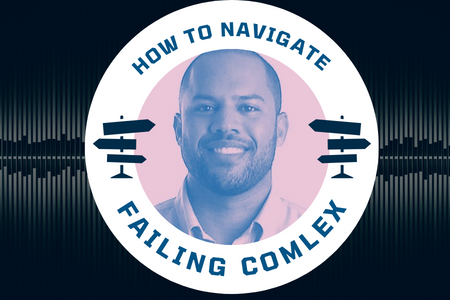On his first attempt at COMLEX Level 1, John Ukadike, DO, failed. He was devastated.
“I would be eating breakfast with tears streaming down my face,” he said. “It’s such a high-stakes exam, and there’s a culmination of all these expectations and factors. It can be overwhelming.”
When Ukadike took the exam again just three weeks later, he was able to improve his score by more than 100 points—enabling him to pass and graduate on time. What felt like a monumental problem at the time turned out to be a small bump in the road.
Here, Ukadike offers his tips for how to overcome initial feelings of disappointment and make an action plan for moving forward.
Talk to someone.
After Ukadike did poorly on his first go-around, he reached out to people on his campus to see if others were in a similar situation, and he also reached out to the top performers in his class and spoke with a counselor.
“For those who didn’t do well, it helps to have an accountability buddy, someone who you can check in with, laugh and cry with if you need to,” he said. “And for those who did do well, it helps to find out what they did to prepare so you can model that.”
Reframe your thinking.
Ukadike said his counselor helped him see the bigger picture.
“She explained how this was one point in time,” he said. “She helped me see that I was in a place where everyone is smart and high performing, and it’s an accomplishment just to get this far. That I had what it takes, I just had to focus. She also told me not to be afraid to ask for help, and I think there’s still a bit of a taboo when it comes to underperforming on COMLEX.”
It was this last part that led Ukadike to create a YouTube video to help others who were in a similar situation.
Recognize that you are more than just your board scores.
While important, Ukadike says that they don’t define who you ultimately become as an osteopathic physician.
“I can restart a heart, read advanced imaging, interpret labs without breaking a sweat, but the thing that matters most is how you treat your patients,” he said. “Be affable, answer the phone, and listen. Those things will make you great. The rest is icing on the cake.”
Nourish your body, as well as your mind.
It might seem like a small thing, but Ukadike says on test day, it’s incredibly important to pace yourself, and don’t skip breaks.
“You need to have the energy to recall all that information, especially towards the end,” Ukadike said. “By the end of my first test I was so exhausted I couldn’t recall anything, I just forgot the last 20 minutes. You have to take those breaks. Bring a snack or some Gatorade. Take the time to reset and it will put you in a better mindset for the rest of the exam.”
Ultimately, Ukadike was able to graduate on time, and land a residency in the Department of Family and Preventive Medicine at the University of Arkansas for Medical Sciences.
“Getting this residency was the best thing that ever happened to me,” he said. “I’ve had access to every specialty, and been given every opportunity to learn. My skills have been bolstered from this experience.”
*The NBOME does not endorse any particular test prep company or the study concepts named in Dr. Ukadike’s video.

